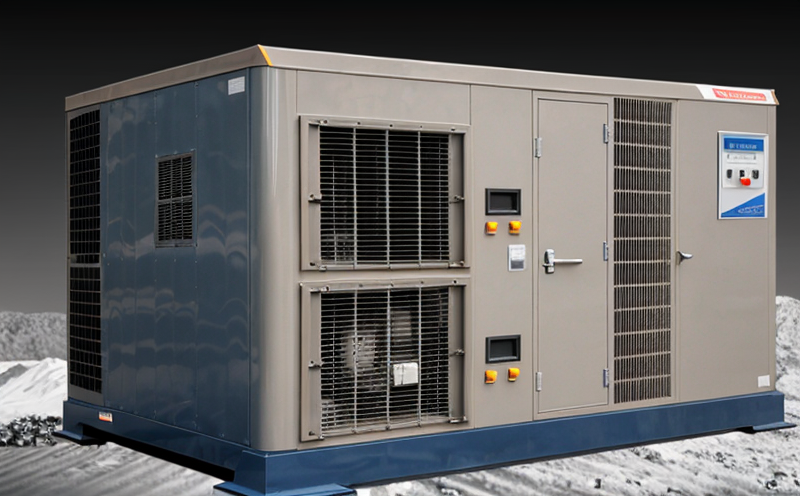JEDDEC JESD22-A135 Moisture Sensitivity Level Thermal Testing
The JEDEC JESD22-A135 test is a critical procedure used to evaluate the moisture sensitivity level (MSL) of semiconductor devices. This testing ensures that electronic components can withstand exposure to humidity without suffering detrimental effects on performance or reliability.
The process involves controlled environmental conditions, including temperature and relative humidity, which simulate real-world storage and handling scenarios. The test is divided into four levels (Level 1 through Level 4), each representing a different sensitivity threshold for moisture absorption. The objective of the testing is to determine the appropriate MSL classification based on the device’s ability to withstand specified conditions without degradation.
During the testing, components are exposed to high humidity and heat stress in accordance with specific test parameters defined by JEDEC standards. After exposure, the samples undergo visual inspection for any signs of moisture absorption or contamination. Post-test analysis includes electrical characterization, mechanical integrity checks, and other relevant tests depending on the device type.
The outcome of this testing is crucial for manufacturers to ensure that their products meet industry standards and can be safely handled during assembly processes without compromising performance. This service plays a vital role in quality control, compliance with international regulations such as ISO and ASTM, and overall product reliability.
The testing process is meticulously controlled to ensure accurate results. The laboratory uses state-of-the-art equipment, including climate chambers capable of precise temperature and humidity control, as well as sophisticated electrical measurement tools. Compliance with these standards ensures that the testing meets industry requirements and provides reliable data for decision-making processes within manufacturing environments.
For quality managers and compliance officers, understanding the significance of MSL classification is essential in preventing potential issues down the line. R&D engineers benefit from this service by gaining insights into how different environmental conditions affect their products' performance. In procurement, knowing that suppliers adhere to such rigorous testing protocols helps ensure supply chain reliability.
Industry Applications
The JEDEC JESD22-A135 Moisture Sensitivity Level Thermal Testing is widely used in various industries where high-performance electronic components are crucial. Here are some key applications:
- Aerospace and Defense: Ensuring reliability of critical electronics under extreme environmental conditions.
- Automotive: Providing robust testing for automotive-grade semiconductors.
- Telecommunications: Guaranteeing signal integrity in communication devices exposed to varying climates.
- Consumer Electronics: Ensuring durability of consumer products against humidity and temperature fluctuations.
| Industry | Main Concerns | Main Benefits |
|---|---|---|
| Aerospace and Defense | Environmental ruggedness, compliance with military standards | Increased confidence in product performance under harsh conditions |
| Automotive | High reliability of components for safety-critical applications | Reduction in warranty costs due to enhanced durability |
| Telecommunications | Signal integrity and data transfer stability | Better network performance and reduced downtime |
| Consumer Electronics | Durability against environmental factors like humidity | Enhanced consumer satisfaction with reliable products |
| Test Parameters | Description |
|---|---|
| Temperature Range | -20°C to 125°C (Typical) |
| Relative Humidity | 85-95% RH |
| Test Duration | 4 hours, depending on the MSL level |
Quality and Reliability Assurance
The JEDEC JESD22-A135 test is an integral part of quality assurance programs aimed at ensuring the reliability and durability of semiconductor devices. By adhering to strict testing protocols, manufacturers can identify potential issues early in the development process, allowing for timely corrective actions.
One major benefit of this service is its role in reducing product failures during assembly or under field conditions. This not only enhances customer satisfaction but also minimizes costs associated with warranty claims and post-sale support. Furthermore, compliance with international standards helps build trust among customers and partners by demonstrating adherence to global best practices.
The testing process also contributes significantly to maintaining regulatory compliance across different regions where the product will be sold or used. This includes meeting requirements set forth by organizations like EU, IEC, and others. By ensuring that all products meet these stringent criteria, companies can avoid potential legal issues and maintain a positive reputation in the market.
For R&D teams, this service offers valuable data on how various materials and designs perform under specified conditions. This information is invaluable for continuous improvement efforts aimed at enhancing product performance and reducing development time. In procurement, knowing that suppliers follow such rigorous testing procedures ensures consistent quality from partner manufacturers.
Customer Impact and Satisfaction
The results of the JEDEC JESD22-A135 test have a direct impact on customer satisfaction by ensuring that electronic components meet or exceed expectations regarding reliability and durability. When consumers purchase devices with well-tested semiconductors, they can be confident in their performance even under challenging environmental conditions.
For businesses operating in competitive markets, achieving high levels of quality assurance through this testing contributes to building a strong brand reputation. Positive reviews from satisfied customers contribute to increased market share and customer loyalty.
In summary, the JEDEC JESD22-A135 test serves as a crucial step in the product development lifecycle, helping manufacturers produce reliable components that meet industry standards while enhancing overall customer satisfaction.





